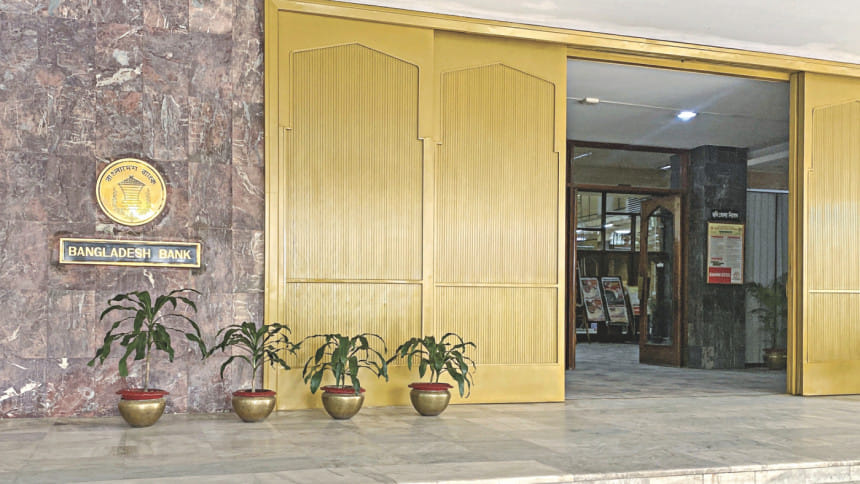Taming The coronavirus rampage: BB roused to action

The central bank has started work on facilitating a soft landing to the economic slowdown brought on by the coronavirus pandemic.
"We will do everything that the economy needs right now," Md Serajul Islam, executive director of the Bangladesh Bank, told The Daily Star yesterday.
As per instruction of the central bank higher-ups the monetary policy department has already started work on slashing the policy rate to inject funds into the economy.
The central bank policy rate (CBPR) is the rate that is used by central banks to implement or signal its monetary policy stance.
The underlying financial instrument of the CBPR varies from country to country and is explained in the metadata.
For instance, in some countries the CBPR is the discount rate, while in others it is a repurchase agreement rate.
The BB last slashed its policy or repo (repurchase agreement) rate by 75 basis points to 6 per cent in April 2018.
The central bank higher ups will sit today to review the overall situation and the issue of cutting the policy rate will be discussed, said Islam, also an executive director of the BB.
"We are looking into the matter. And the central bank will take a positive decision within the shortest possible time to this end," he added.
The BB's impending reinforcing move comes after a number of central banks of around the world including that of the US, the UK, Canada and Norway have done the same to counter the economic shock stemming from the virus that has infected 286,816 persons in 186 countries and territories across the globe and killed 11,904.
Experts and bankers said there is no scope for dilly-dallying as the situation is getting worse at breakneck speed.
Banks will face severe consequences and many factories will have to shutter if massive liquidity support is not provided, experts said.
But only slashing the policy rate would not be enough to blunt the economic damages brought on by the novel virus that has left the country in a state of shock.
At the time of writing, there has been 24 confirmed cases of COVID-19, while two have died.
The central bank should also take preparations to purchase Treasury bonds and bills -- which are in the banks' possession in the form of excess assets -- in a massive scale.
When asked whether the central bank had taken such preparations, Islam said the BB is ready to inject liquidity to prop up the economy as per requirement.
"The economy is now on the verge of recession," said Ahsan H Mansur, executive director of the Policy Research Institute.
The central bank needs to declare strong policy measures without further ado such that the private sector gets a boost in confidence.
At least Tk 25,000 crore will have to be injected in to the market at present such that the private sector will enjoy available cash to protect their enterprises from losses, he said.
The central bank will have to supply the cash to the bank. The banking regulator will have to do so by way of cutting the policy rate and purchasing the T-bills and bonds, said Mansur, also a former official of the International Monetary Fund.
Excess liquidity in the banking sector stood at Tk 105,646 crore as of December last year, according to data from the central bank.
Banks hold the majority of the excess liquidity in the form T-bills and bonds.
"The central bank has taken some initiatives, but this is highly inadequate given the gravity of the situation."
A good number of industries are set to face a crisis in the wake of cancelling export orders, he said.
Against the backdrop, the government should declare more than Tk 25,000 crore as subsidy for enterprises to facilitate them to provide wage and salary to their workers, said Mansur, also the chairman of Brac Bank.
Both the government and the central bank should take all types of policy measures to run industrial plants, said Salehuddin Ahmed, a former governor of the central bank.
The BB's measure thus far, which is not to consider businesspeople as defaulters in case of failure to repay instalments until June 30, is a good initiative.
But the central bank should ask banks not to impose any interest on the businesses as they will be unable to pay any penny.
The annual development programmes should be cut to bailout the private sector, he said, adding that the National Board of Revenue will have to shun realising corporate and advanced taxes from businesses.
Special refinance schemes will have to be declared to protect small and medium enterprises from losses.
"The policy measures will have to be announced within a day or two. Or else, the private sector will be panicking," Ahmed added.
AB Mirza Azizul Islam, a former finance adviser of a caretaker government, echoed the same, while urging the government to do so with a view to keeping the confidence of the private sector afloat.
The central bank will have to introduce liquidity support for banks as soon as possible as a good amount of exporters have failed to realise their export proceeds, said Syed Mahbubur Rahman, managing director of Mutual Trust Bank.
Banks earlier settled back-to-back letters of credit for exporters in order to help them manufacture the exported goods, he said.
They are now unable to get back the fund, which will create a liquidity crisis in the banking sector in the days ahead, said Rahman, also the immediate past chairman of the Association of Bankers, Bangladesh, a forum of managing directors of banks.

 For all latest news, follow The Daily Star's Google News channel.
For all latest news, follow The Daily Star's Google News channel. 



Comments